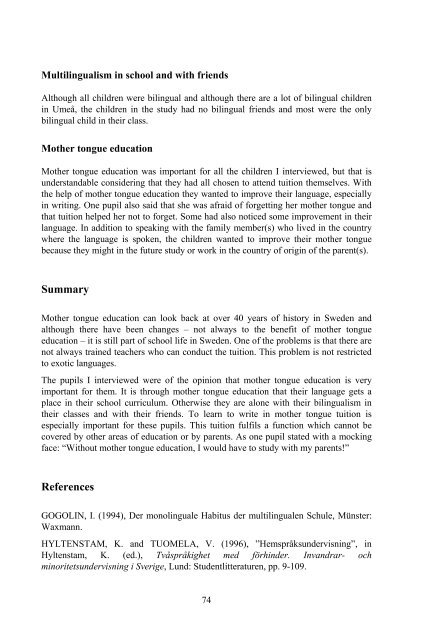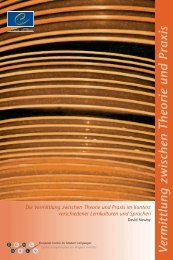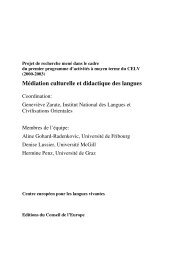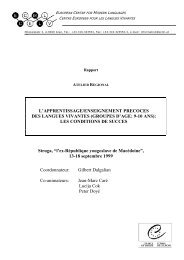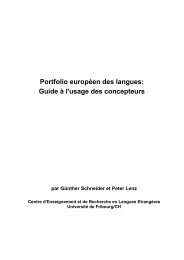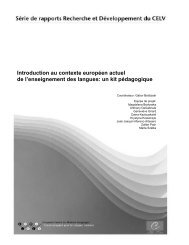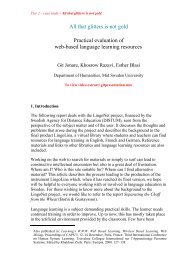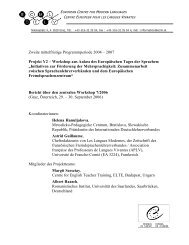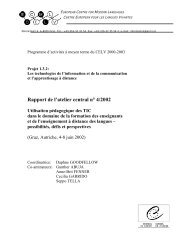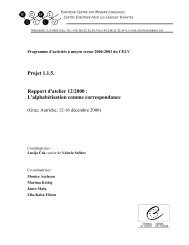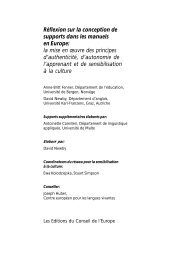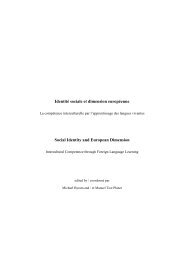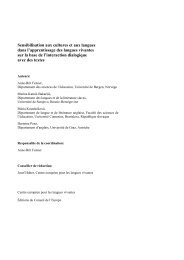cohesion - European Centre for Modern Languages
cohesion - European Centre for Modern Languages
cohesion - European Centre for Modern Languages
Create successful ePaper yourself
Turn your PDF publications into a flip-book with our unique Google optimized e-Paper software.
Multilingualism in school and with friends<br />
Although all children were bilingual and although there are a lot of bilingual children<br />
in Umeå, the children in the study had no bilingual friends and most were the only<br />
bilingual child in their class.<br />
Mother tongue education<br />
Mother tongue education was important <strong>for</strong> all the children I interviewed, but that is<br />
understandable considering that they had all chosen to attend tuition themselves. With<br />
the help of mother tongue education they wanted to improve their language, especially<br />
in writing. One pupil also said that she was afraid of <strong>for</strong>getting her mother tongue and<br />
that tuition helped her not to <strong>for</strong>get. Some had also noticed some improvement in their<br />
language. In addition to speaking with the family member(s) who lived in the country<br />
where the language is spoken, the children wanted to improve their mother tongue<br />
because they might in the future study or work in the country of origin of the parent(s).<br />
Summary<br />
Mother tongue education can look back at over 40 years of history in Sweden and<br />
although there have been changes – not always to the benefit of mother tongue<br />
education – it is still part of school life in Sweden. One of the problems is that there are<br />
not always trained teachers who can conduct the tuition. This problem is not restricted<br />
to exotic languages.<br />
The pupils I interviewed were of the opinion that mother tongue education is very<br />
important <strong>for</strong> them. It is through mother tongue education that their language gets a<br />
place in their school curriculum. Otherwise they are alone with their bilingualism in<br />
their classes and with their friends. To learn to write in mother tongue tuition is<br />
especially important <strong>for</strong> these pupils. This tuition fulfils a function which cannot be<br />
covered by other areas of education or by parents. As one pupil stated with a mocking<br />
face: “Without mother tongue education, I would have to study with my parents!”<br />
References<br />
GOGOLIN, I. (1994), Der monolinguale Habitus der multilingualen Schule, Münster:<br />
Waxmann.<br />
HYLTENSTAM, K. and TUOMELA, V. (1996), ”Hemspråksundervisning”, in<br />
Hyltenstam, K. (ed.), Tvåspråkighet med förhinder. Invandrar- och<br />
minoritetsundervisning i Sverige, Lund: Studentlitteraturen, pp. 9-109.<br />
74


